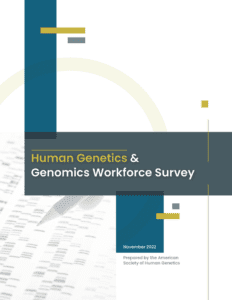 With historically little data available on the characteristics of the human genetics and genomics workforce, ASHG in a collaborative partnership between the National Society of Genetic Counselors (NSGC) and the American College of Medical Genetics and Genomics (ACMG), conducted a first-of-its-kind survey to understand the demographics of the workforce, as well as the climate and culture in training programs and the workplace. This work, which was funded by the National Human Genome Research Institute (NHGRI), was also done in collaboration with the Association of Professors of Human and Medical Genetics (APHMG), the American Board of Medical Genetics and Genomics (ABMGG), and the Minority Genetic Professionals Network (MGPN).
With historically little data available on the characteristics of the human genetics and genomics workforce, ASHG in a collaborative partnership between the National Society of Genetic Counselors (NSGC) and the American College of Medical Genetics and Genomics (ACMG), conducted a first-of-its-kind survey to understand the demographics of the workforce, as well as the climate and culture in training programs and the workplace. This work, which was funded by the National Human Genome Research Institute (NHGRI), was also done in collaboration with the Association of Professors of Human and Medical Genetics (APHMG), the American Board of Medical Genetics and Genomics (ABMGG), and the Minority Genetic Professionals Network (MGPN).
Released last month, the Human Genetics & Genomics Workforce Survey Report, provides an in-depth look at the field’s workforce demographics, including race, ethnicity, or ancestry; gender identity; sexual orientation; age; disability status; and disadvantaged background. The report highlights that the pace of progress has been slow in addressing the lack of diversity in the human genomics and genetics sector. Additionally, insights were revealed that underscore the challenges various organizations must address to build a more diverse and inclusive workforce.
Key findings from the report include the following:
- The majority (73.3%) of survey respondents identified as U.S. citizens. Approximately 78 percent were employed in a permanent position. Genetic counseling (45.7%), research (30.4%), and academic (23.4%) were the top three primary areas of work for employed respondents.
- The genetics and genomics workforce is predominantly homogeneous with 67.0% of respondents identifying their race, ethnicity, or ancestry as White. Additional self-reported races, ethnicities, or ancestries (17.5%) include Asian (7.4%); Black, African American, or African (1.5%); Hispanic, Latino, or Spanish (2.0%); Middle Eastern or North African (1.1%); American Indian or Alaska Native (<1%); Native Hawaiian or other Pacific Islander (<1%); and Multiracial (4.8%).
- Women made up the majority of survey respondents (74.7%). Additionally, 23.3% of respondents identified as men and 0.5% identified as nonbinary or transgender. 228 (6.9%) reported identifying as lesbian, gay, bisexual, transgender, queer, intersex, asexual (LGBTQIA).
Overall, the report lays important groundwork for future assessment and action by individuals, organizations, and departments in governmental, and non-profit, academic and industry sectors. The report’s partners are planning to review the report carefully and consider the actions they will take, within their own mission and programs, to realize a vision for the future of a diverse, equitable and inclusive human genetics and genomics workforce.
For more information on the report, please see the Key Takeaways document. NHGRI, along with ASHG, ACMG, and NSGC, hosted a webinar earlier in December during which panelists provided remarks on the significance of the survey for their respective memberships. Please see the recording for their full remarks.
